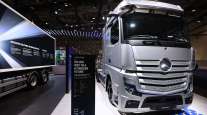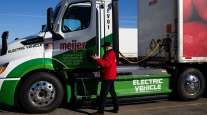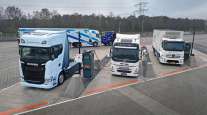Daimler Cites Flexibility as Key to Zero-Emission Future
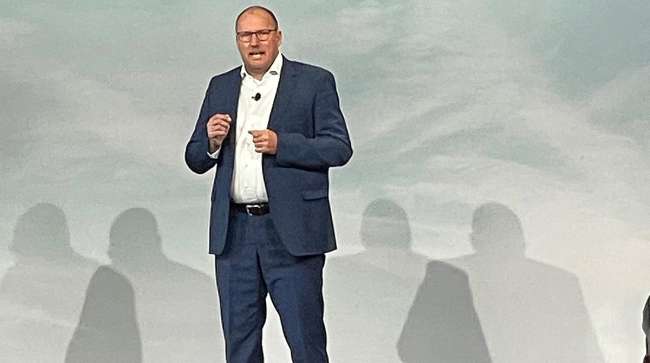
[Stay on top of transportation news: Get TTNews in your inbox.]
BOSTON — Daimler Truck CEO Martin Daum said flexibility is the key to his company’s preparation for the zero-emission future that is broadly envisioned for trucking, and stressed that customer needs are at the forefront of how that future will unfold.
“We have all the technology in stock that is needed for this historic transformation, and we can deploy it in a very efficient way,” Daum said about his company’s vehicle lineup during Daimler Truck’s July 11 Capital Market Day 2023, its first as an independent company. “We leverage our global scale, and we engage in strategic partnerships. This means we have the right, cost-efficient solutions for different transportation needs and scenarios. We are able to successfully navigate the uncertain environment going forward.”
Daum and other Daimler executives on hand for the event — attended by a packed room of financial analysts and smaller cadre of press — stressed that total cost of ownership is a key metric that its customers must weigh when considering zero-emission vehicles, and it’s one that varies among those customers.
“What are the decisive factors for making zero-emission transport for the mass market?” he asked. “Customers need to be able to buy the right vehicles, be able to charge them, and make money with them. Right now this is not the case.”
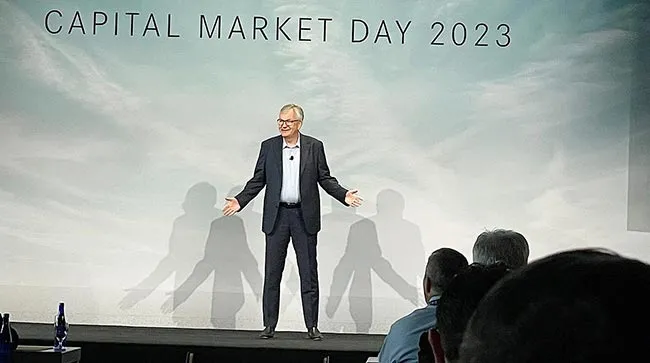
Martin Daum says, “We have all the technology in stock that is needed for this historic transformation, and we can deploy it in a very efficient way.” (Joe Howard/Transport Topics)
To illustrate the challenge, he compared the total cost-of-ownership consideration to a multiplication problem with three factors: vehicles, infrastructure and cost parity. Stressing that Daimler has the first factor covered — the company has vehicles ready — on the second and third, he stressed that much work remains.
“Regarding infrastructure, a lot obviously needs to be done,” Daum said. “A green energy infrastructure is the basis for green transportation. By building this infrastructure all the way, from energy generation to distribution of energy, involves a huge effort. I am confident, however, that we will see infrastructure projects gaining momentum, because energy companies are increasingly recognizing attractive business cases, and policymakers are fully aware that infrastructure is key in any ambitious CO2 reduction goals they have set.”
The third factor — cost parity — relies heavily on policymakers passing legislation to propel adoption, Daum said. “We at Daimler Truck work hard to bring down the cost of zero-emission vehicles,” he said. “But let me state very clearly, for the foreseeable future, cost parity can only be achieved with conventional vehicles if policymakers are willing to implement the right regulatory framework. Measures are needed, such as CO2 [taxes] and CO2-based tolls,” the latter being more focused in Europe, he said.
He also suggested additional taxes on fossil fuels. “Policymakers are setting ambitious CO2 reduction targets in many key regions,” he added. “They need to back them up with zero-emission measures. If you want to fight climate change, you have to make CO2 emissions more expensive.”
Daum acknowledged during a media roundtable that changes in political leadership can affect the level of government support the industry may receive, but stressed that a firm “societal commitment” to addressing climate change can propel broader adoption of zero-emission vehicles. “If this is not there, it’s not going to work,” he said.
Daum added, “Do we want to fight climate change, or do we want to let it happen? We cannot stem the tide of the political environment.”
Our first Capital Market Day as an independent listed company is in the books. Thank you for joining us yesterday! You can find a recording of our event here: https://t.co/JUxoY5uDnd#DaimlerTruck #CapitalMarketDay #DTR0CK pic.twitter.com/vt3no5Dfsz — Daimler Truck AG (@DaimlerTruck) July 12, 2023
Daum stressed that both Daimler and its customers must work together with so much uncertainly still lingering around the rollout of zero-emission trucks.
“Flexibility is key,” he said. “You have to be able to drive the transformation at different speeds in different regions, and that’s exactly what we are doing.”
Daum added, “Our customers can be sure that we will be able to deliver the right products in the right place at the right point of time to meet their needs.”
An eventual production ramp-up of zero-emission trucks could be lifted by the fact that developmental dollars have already been spent, and Daimler will remain diligent about how it invests going forward, said CFO Jochen Goetz.
Want more news? Listen to today's daily briefing above or go here for more info
“We are not starting with development — some of what we are using is pretty proven technology,” he said. “Today we are investing heavily in [zero-emissions], that is baked in the numbers. The investment in [internal combustion] will go down because we won’t have to invest in diesel.”
He stressed that the company will assess where it needs to invest, or where partnership with another supplier may make more sense. He cited the company’s decision to use Cummins engines in its medium-duty lineup as an example.
“[Something] may be a good business, just not for us anymore,” Goetz said. “We will invest in the technology we need.”


